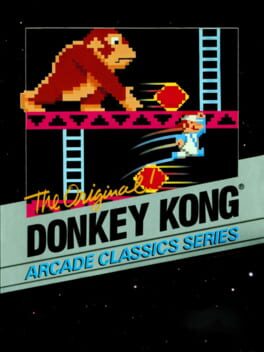I felt compelled to replay this after my recent playthroughs of BurgerTime and Popeye, both games that owe a lot creatively to Nintendo's first big hit. I've always felt a little underwhelmed by Donkey Kong, but it wasn't until playing those other games that I could articulate the reasons why.
For starters, what I appreciate about the gameplay in both BurgerTime and Popeye (and, to some extent, in other early platform games like Mario Bros.) is that at all times they promote the player's awareness of the entire stage. Because both the objective and the enemies are constantly changing locations in those games, you need to think several steps ahead in terms of navigating the stage. In Donkey Kong, however, it never really matters what's happening two or three platforms away from you. The game is easy enough that by the time you get where you want to go (which is almost always just "up"), even if there's an obstacle in your way, there's usually an obvious solution for dealing with it.
To be fair, this starts to change a bit as the difficulty increases. In the first stage, for example, DK eventually starts to throw two barrels in a row, which prevents you from simply leaping over them. But in the elevator stage and the final stage -- a BurgerTime-esque level in which the player must run across the locks on each platform to collapse the girdered structure DK has made into his fortress -- it's rarely necessary to look beyond the immediate sphere of the player character. These stages are a cakewalk, even in later phases of the game.
And speaking of sweets, it's worth mentioning the fact (which I discovered only today) that the NES version of Donkey Kong entirely removes the "pie factory" level that was present in the arcade release. (I'd felt like there was something amiss when I played the NES version on Switch a year and a half ago, but I couldn't put my finger on it at the time.) Being as easy as it is, the original game's best asset is its gameplay variety -- the fact that it's essentially four games in one -- and the NES version unfortunately spoils that quality.
Donkey Kong is an important game for many reasons, but I would argue its being "timeless fun" isn't one of them. The game's best qualities were eclipsed within a year of its release by games like Popeye and even Donkey Kong Jr. That's not a slam on this game so much as an affirmation that Donkey Kong was just the beginning in a long corporate trajectory, whereby Nintendo would gradually perfect its sense of what constitutes great game design. Not coincidentally, I'm hard-pressed to think of a less fun Nintendo "classic" than this one -- the game that started it all.
For starters, what I appreciate about the gameplay in both BurgerTime and Popeye (and, to some extent, in other early platform games like Mario Bros.) is that at all times they promote the player's awareness of the entire stage. Because both the objective and the enemies are constantly changing locations in those games, you need to think several steps ahead in terms of navigating the stage. In Donkey Kong, however, it never really matters what's happening two or three platforms away from you. The game is easy enough that by the time you get where you want to go (which is almost always just "up"), even if there's an obstacle in your way, there's usually an obvious solution for dealing with it.
To be fair, this starts to change a bit as the difficulty increases. In the first stage, for example, DK eventually starts to throw two barrels in a row, which prevents you from simply leaping over them. But in the elevator stage and the final stage -- a BurgerTime-esque level in which the player must run across the locks on each platform to collapse the girdered structure DK has made into his fortress -- it's rarely necessary to look beyond the immediate sphere of the player character. These stages are a cakewalk, even in later phases of the game.
And speaking of sweets, it's worth mentioning the fact (which I discovered only today) that the NES version of Donkey Kong entirely removes the "pie factory" level that was present in the arcade release. (I'd felt like there was something amiss when I played the NES version on Switch a year and a half ago, but I couldn't put my finger on it at the time.) Being as easy as it is, the original game's best asset is its gameplay variety -- the fact that it's essentially four games in one -- and the NES version unfortunately spoils that quality.
Donkey Kong is an important game for many reasons, but I would argue its being "timeless fun" isn't one of them. The game's best qualities were eclipsed within a year of its release by games like Popeye and even Donkey Kong Jr. That's not a slam on this game so much as an affirmation that Donkey Kong was just the beginning in a long corporate trajectory, whereby Nintendo would gradually perfect its sense of what constitutes great game design. Not coincidentally, I'm hard-pressed to think of a less fun Nintendo "classic" than this one -- the game that started it all.
